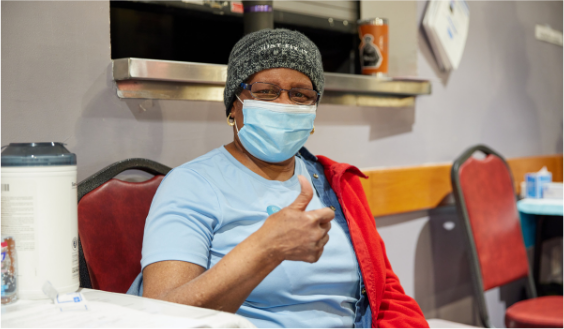
“There’s something sacred about seeing people come to a place where there’s already a level of trust and a sense of belonging and togetherness. People come in to get their vaccines and leave with groceries and supplies or they’ll be in a corner praying with Bishop Borders at Morning Star Church. They run into friends they haven’t seen in a year. Every site is so special because they represent the uniqueness of each neighborhood—we seamlessly fit in because we’ve tailored each site and worked alongside leaders.”
– Petrina Cherry, vice president of community engagement and external affairs
In this edition of Boston Medical Center’s Heroes, we are honoring the legion of teams, departments and community leaders who have helped stand up five vaccination sites for Boston neighborhoods most impacted by COVID-19—an initiative born out of BMC’s commitment to ensure equitable access to health care.
Over the course of several weeks, vaccination locations were set up in in Mattapan, Roslindale, Hyde Park, South End and Dorchester. Although concurrently launching the sites has been no small feat, numerous departments—including Strategy, Patient Registration, Pharmacy, Patient Financial Services, Environmental Services, Facilities, Revenue Cycle, Information Technology Services, Operations, Legal, Communications and Human Resources—and volunteers eagerly jumped at the opportunity to help with tireless momentum.
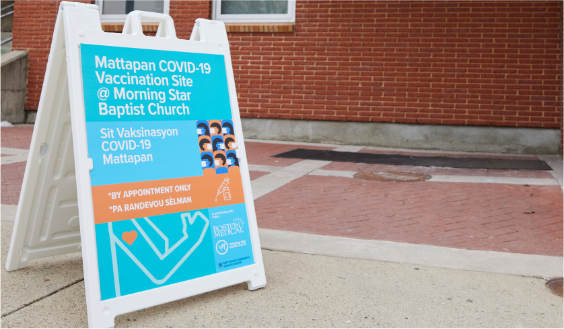
With hard work comes great outcomes: Within three weeks, more than 5,600 people had been vaccinated at the sites. And that number continues to grow.
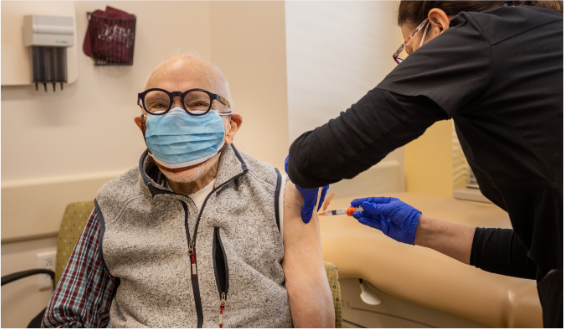
Petrina Cherry, vice president of community engagement and external affairs, shares why BMC is at the helm of bringing the vaccine to hard-hit areas and what operationalizing the sites means for BMC’s patients, Boston’s communities and advancing health equity.
“The statistics told us, time and again, about how social determinants of health mattered when it came to this virus. We were seeing health disparities. People from Black and Brown communities were the sickest and dying more than others. Now, it’s up to BMC to make sure the people who suffered most have the greatest level of access to the vaccine and that’s what we’re doing with our vaccination sites.”
“If anyone is coming with solutions to address the issues that arose from the COVID pandemic, it’s BMC. We are a safety-net hospital smack dab in the middle of ZIP codes that represent historically disinvested communities and where members have high needs. We were the COVID hospital. Between our partnerships, our clinicians setting the standard for how to create opportunities and access for disparate communities with large numbers of determinants of health and the support of our leadership, we have the right combination of ingredients to build success for our patients and communities.”
Deciding where to set up the vaccination sites was a strategic and data-driven effort. Part of this included using variables from the CDC’s social vulnerability index (SVI)—defined in part as helping “identify communities that may need support before, during or after disasters”—to map out areas of highest priority.
“We asked ourselves, ‘How do we make sure the vaccine is accessible to people of color?’ We used SVI data to plot where we needed to be—not just for the members of our health system but for everyone who was impacted the greatest. We made sure people did not have to travel more than two miles, whether by walking or through public transportation. We were very intentional in our planning.”

In addition to a data-informed plan, it was also vital that neighborhoods were represented and heard in the startup process—and continue to be.
“We all worked together configure the best approach for setting up the sites. Everyone had a seat at the table. My role has really focused on being a voice for the neighborhoods, looking at the process from their perspective and building relationships. I’m making sure we are connecting with the right people and upholding any cultural nuances unique to each area. It’s important we’re respectful and collaborative.”
“We’ve been hosting community conversations with people like faith leaders, social impact influencers—people who are corporate leaders or community leaders—and school leaders. BMC’s clinicians will talk about the vaccine, what it is and how it was developed. They’ll dispel myths and cover frequently asked questions. I’ll then come in and talk about our five sites and where people can register. Then, the entire second half of the segment is for the community. It’s not just a time for questions, however. It’s a time for us to ask them, ‘What can we do better? How can we better serve you?’”
Vaccination sites were set up in locations that are well-known in each neighborhood so patients could feel comfortable receiving their vaccines in familiar spaces.
“There’s something sacred about seeing people come to a place where there’s already a level of trust and a sense of belonging and togetherness. People come in to get their vaccines and leave with groceries and supplies or they’ll be in a corner praying with Bishop Borders at Morning Star Church. They run into friends they haven’t seen in a year. Every site is so special because they represent the uniqueness of each neighborhood—we seamlessly fit in because we’ve tailored each site and worked alongside leaders.”
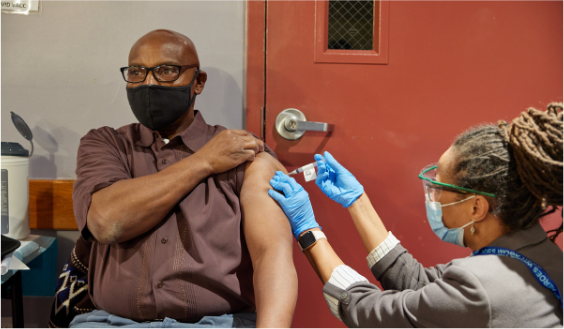
Employees and volunteers are just as important as the locations. From BMC’s compassionate staff to community leaders greeting and conversing with patients, each site boasts a welcoming environment and a strong sense of teamwork.
“When you walk into any of the vaccination sites, the excitement is palpable. We already know BMC’s staff is awesome but it’s especially profound at the sites. They’re so loving and open.”
“There’s been a strong partnership with religious leaders in reaching people who are eligible to receive the vaccine. They’re doing their own outreach and sending us referral lists. For example, we have two ministers who are also medical doctors. They pulled a team together to start a phone bank. They called parishioners and colleagues, answered questions and got them registered. This is really what it’s about—it’s the coming together of a community.”
The response from communities has been powerful.
“Someone said, ‘It’s so fitting that a place where people come for weddings and parties now gives us another reason to celebrate.’ You see people get their first dose and a sense of relief washes over them. People are saying, ‘This is getting me one step closer to seeing my grandkids again’ or, ‘I’ll be able to hang out with my neighbors.’”
“There was a teenager who lived in a multi-generational home with his mother and grandmother whose first language was not English. He was also his grandmother’s personal care assistant. He had a conversation with them about the vaccine and convinced them to get vaccinated. With that we realized high schoolers have a lot of influence in their households. Now, we’re helping students become ambassadors in their households and neighborhoods.”
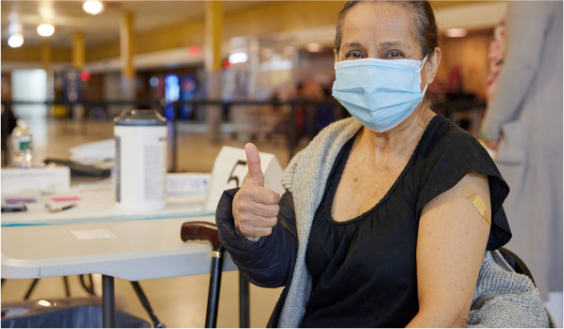
In addition to literally opening doors, the effort is also carving pathways toward health equity.
“We have a huge opportunity to make really significant changes with regard to thriving and health equity. For example, engaging community members with opportunities for economic mobility and financial security, so they can have the necessary resources to prioritize their health; such as stable housing and food security. What we’re doing now is an important gateway to that work. Just like the vaccination sites, what we create needs to be informed by the community and built on trust. We believe in having conversations and asking questions like, ‘What can we do better around housing? How can we partner with you on your path to success? In order to successfully move from charity to equity, we must know how to best meet people’s needs.”
“Being in the communities is the best thing we can do to strengthen the bridge between community-based organizations and BMC—it is the backbone for all of our equity initiatives going forward. Doing the work and being of service in these areas speaks volumes—we’ve really deepened our relationships and created a bond that didn’t exist before. This trust is amazing, but it’s fragile. We have to continue to show up in the ways we’ve promised. We have to continue to be great listeners and learners.”
While the road ahead may be long, it’s built on an enduring pledge to create—and sustain—change.
“It’s been a very difficult year for Black and Brown people, from losing their jobs due to COVID to contracting the virus and dying at alarming rates. All of this is happening against a backdrop of systemic racism. The fact that BMC is ‘here’ administering vaccines is a signal that we are also ‘here’ in bigger ways. Everyone is so proud of the work they’re doing and we’re all incredibly excited for the difference we’re making each day. I know I’m not just speaking for myself when I say these have been some of the most rewarding days of my career. It’s so amazing to see our organization serve people in this way. People are being heard.”
This is just a glimpse into the extraordinary work taking place at Boston Medical Center every day. To ensure BMC remains a beacon of hope and healing for our patients and community, please consider making a donation today.